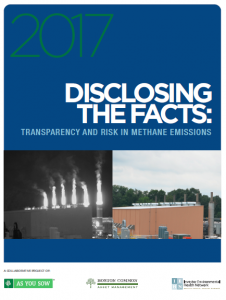Visit DisclosingTheFacts.org to view the full report, out now!
As You Sow, Boston Common Asset Management, and The Investor Environmental Health Network (IEHN) have released a 2017 special edition of the Disclosing the Facts (DTF) scorecard. While the annual DTF scorecard has historically addressed oil and gas company management of environmental and community risks from hydraulic fracturing operations, this year’s special edition focuses on the critical risk of methane emissions – a potent contributor to global climate change – and how companies are managing methane reductions. DTF 2017 finds a striking range of differences among the 28 companies’ methane management disclosures.
Download the full press release
“This year’s report reflects rising investor concern that excessive methane emissions from oil and gas operations will undercut the potential net climate benefit of substituting natural gas for coal, especially in decarbonizing energy markets,” said Steven Heim, Managing Director at Boston Common Asset Management, LLC. “Investors are increasing focus on carbon risk, shown clearly by majority shareholder votes this year calling for 2 degree scenario reporting.”
The oil and gas industry is the largest source of methane emissions in the U.S. The International Energy Agency’s World Energy Outlook 2017 contends that methane emissions from the oil and gas value chain are among the cheapest to abate of all anthropogenic emissions. Reducing methane emissions in the near term presents an important opportunity to slow the rate of global warming.
DTF 2017 found six companies were especially strong performers in implementing and disclosing best methane reduction practices: Apache (NYSE:APA), BHP (NYSE:BBL), and Southwestern Energy (NYSE:SWN) each earned 12 of 13 possible points. Shell (NYSE:RDS.A), ConocoPhillips (NYSE:COP), and Hess (NYSE:HES) earned 11 points each. Exxon Mobil (NYSE:XOM) also improved its methane reduction program and disclosures this year, following a 2017 shareholder proposal filed by As You Sow. Chevron (NYSE:CVX), however, is a laggard in methane disclosures, earning only 2 points. It is joined by other laggard companies Cabot Oil & Gas (NYSE:COG) and Encana (NYSE:ECA) with 0 points each; and Continental Resources (NYSE:CLR), EQT (NYSE:EQT), QEP Resources (NYSE:QEP), and Whiting Petroleum (NYSE:WLL) at 1 point each.
“Importantly, the oil and gas industry, even after consistently strong resistance to regulation, recognizes the need to address methane leaks to help reduce the risk of catastrophic climate change,” said Danielle Fugere, President of As You Sow. The American Petroleum Institute announced last week the formation of an environmental partnership of 26 companies, including many of the top U.S. natural gas producers, to cut methane leaks from wells and other U.S. onshore production sources. This announcement came despite the Trump Administration’s backing away from methane regulation. In November, large international oil and gas companies including Exxon Mobil, signed up to “guiding principles” for cutting methane emissions. These are in addition to voluntary commitments announced in 2014 and 2016 by Apache, BHP, Hess, and Southwestern Energy as founding members of the ONE Future Coalition.
“While providing insufficient company-specific reporting, these actions indicate a recognition that the oil and gas industry must address readily controllable methane emissions associated with its product,” said Dr. Richard Liroff, Executive Director of the Investor Environmental Health Network. “As our scorecard demonstrates, there are sharp differences among companies in how well they disclose their concrete actions to reduce methane emissions. Those companies taking effective action will reduce their carbon risk, a key consideration for investors.”
Disclosing the Facts: Transparency and Risk in Methane Emissions provides clarity for investors and companies on key actions companies should be taking to reduce methane emissions – and the disclosures necessary to help investors understand which companies are taking effective action.



